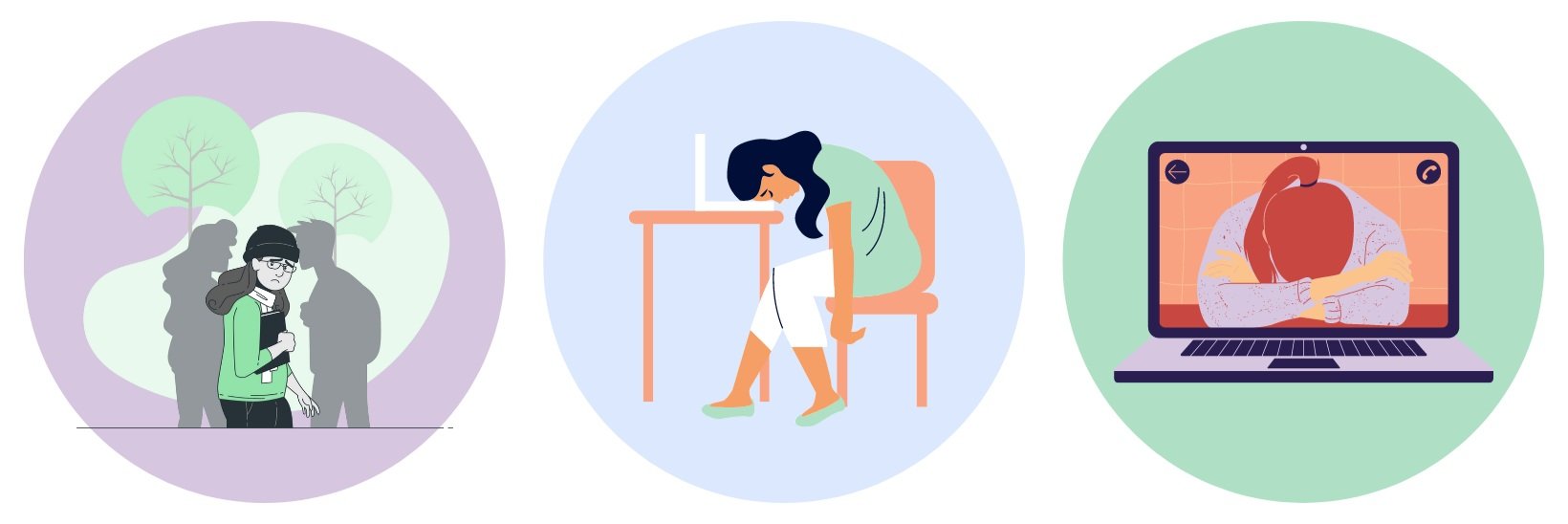Google, Meta, And Other Tech Giants Sued By US School System: Blames Them For Mental Crisis Among Students
Social Media platforms like Google, Meta, TikTok and Snapchat sued by US school system over mental crisis among students

Google, Meta, and other tech-giant owned social media platforms are reporting increases in their user numbers as well as in the frequency and length of time that users spend on them.

A Maryland school district has filed a lawsuit against Meta, Google, Snapchat, as well as TikTok for allegedly leading to student mental health problems. According to the complaint, which was brought on behalf of Howard County Public School System (HCPSS), students are going through an unparalleled mental health crisis that is being fuelled by harmful and addicting social media goods.
The number of Americans using social media has increased dramatically in the last ten years. That increase in utilization is not a coincidence. According to the lawsuit, it is the outcome of the defendants’ concerted attempts to get young people to use Instagram, Facebook, TikTok, Snapchat, along with YouTube obsessively.
According to the complaint, their development is a result of decisions they took to build and run their platforms in a manner that takes advantage of the psychology and neurophysiology of the people who use them to encourage them to spend increasing amounts of time on them.
Experts have raised concerns about the possible negative effects of social networking sites on children and teenagers, especially in light of the revelations made by Facebook whistle-blower Frances Haugen in a trove of internal research that Meta had been conscious of the potential damage Instagram would do to some of its younger users.

Internal inquiries made public through Frances Haugen around 2021 revealed that the corporation was aware that Instagram had a harmful impact on teens’ self-images, exacerbated eating disorders, and increased suicidal ideation. According to her, the platform put profits ahead of user safety and withheld its own findings from shareholders as well as the general public.
Dr. Vivek Murthy, the U.S. Surgeon General, published a recommendation last month advocating for stricter security and disclosure regulations and citing studies showing that teens who use online platforms excessively are more likely to experience depression and stress.
In its case, HCPSS claimed that the businesses’ activities had compelled the district to recruit more staff, invest more in employee education, and create fresh assets in order to address the growing requirements of kids’ emotional, social, and mental wellness.
According to lawyer Philip Federico in his statement, school districts around the country, including Howard County, struggle to meet children’ requirements while still delivering exemplary education and fostering an optimal atmosphere for learning. This action seeks to hold social media firms accountable for their role in promoting mental illness among young people and to compensate for the financial burden the defendants’ exploitative platforms have placed on the HCPSS.
The complaint identified a number of problems with social networking platforms, which include the dopamine-stimulating incentives that are addicting across every application, including TikTok’s ‘For You’ tab, which uses information about user behavior to offer an infinite stream of recommended material.
It additionally noted the algorithms and characteristics of Facebook and Instagram’s algorithms for recommendation that are intended to produce dangerous cycles of recurrent and excessive product consumption. These methods can be especially damaging to young people as well as highly successful. The complaint claimed the defendants deliberately encouraged a mental health problem among American adolescents.
Their schemes of operation capitalize on adolescents and young children. These ages tend to use the Internet often, are more inclined to possess social media user accounts, and are more likely to spend their spare moments on the internet. According to the school district, all of the defendants created product characteristics to encourage youngsters’ compulsive, repetitive usage in an effort to capture the lucrative but unexplored demographic of tween as well as teen users.
Similar cases regarding the detrimental effects that social media has had on children’s psychological well-being have been brought by school districts in Washington, Florida, California, Pennsylvania, New Jersey, Alabama, Tennessee, and numerous other states.
The court records note a thirty percent rise in depression amongst children from 2009 to 2019 as evidence that the poor mental health of children has had a direct impact on Seattle Public Schools, which runs 106 schools having over 49,000 students.

In accordance to the lawsuit, students with anxiety, depression, as well as other disorders of the mind act out more often, perform worse academically, are more unlikely to show up for class, and are somewhat more inclined to use drugs or alcohol. All of these factors have a negative impact on Seattle Public Schools’ capacity to carry out its educational mission.
Similar to school systems around the nation, Seattle Public Schools along with its school-based counselling centers are one of the main sources of mental wellness support for kids in the neighborhood. However, the complaint claims that the district’s medical professionals, social workers, psychiatrists, and counsellors are overworked and require increased funding to fulfil the increasing need for their services.
The powerful CEO of Meta, Mark Zuckerberg, has already supported educational reform, contributing $120 million to San Francisco Bay Area schools over ten years ago. Nevertheless, in the 116-page case, Facebook and Instagram are referred to as a public nuisance, and Meta along with remaining businesses are charged with racketeering, gross negligence, conspiracy, and unfair competition.
It is imperative that these companies take responsibility for their role in this crisis affecting our youth.
– Judy Mickens-Murray
The plaintiff adds that the defendants purposefully changed the layout and functionality of their applications in order to take advantage of children’s psychology and neurophysiology after realizing the value of appealing to young consumers. Children and teenagers do not possess the same levels of emotional maturity, impulsive oversight, and cognitive resilience as adults since their brains have not completely evolved. They are therefore especially sensitive to the negative effects of the addictive characteristics found in digital items.
Although the lawsuit fails to indicate how much money will be awarded in damages, it seeks for money to cover the costs the county is expected to incur as it expands its psychological health services. Additionally, the county is requesting punitive damages from the jury.
In response to social networks safety concerns, several jurisdictions have enacted legislation that forbids kids from using social media. Arkansas has approved a similar legislation prohibiting minors from accessing social networks, while Utah will outlaw the use of social media by those below the age of 18 beginning next year. At the same time, despite objections from civil rights as well as privacy opponents, multiple national internet safety laws—some of which would include a web-based age verification system—made their way through Congress.
Google, Meta and Snapchat Respond to the Lawsuit
According to José Castaneda, a representative for Google, these concerns are simply unfounded. According to Google spokesperson Ivy Choi, safeguarding children throughout all of their sites has constantly been at the heart of their efforts. He went on to say that they had created age-appropriate YouTube experiences for children and families in partnership with child development experts, and that they offered parents powerful controls. He used the example of how Family Link allows parents to create reminders, establish screen time limits, and ban particular sorts of content on monitored devices. The claims made in these allegations are untrue.
In the words of Antigone Davis, the global head of security at Meta, they have made investments in technology that discovers and eliminates information about suicide, self-harming behaviors and eating disorders before anybody reports it to them. He said that although these are complicated challenges, they will keep working with parents, professionals, and authorities like Attorney general to introduce novel characteristics, instruments, and regulations that would be suitable for teens and their families.
He said that Meta wants young people to use the internet safely. Over thirty tools have been created to aid families and teenagers, involving age verification technologies to ensure that teenagers are having interactions that are suitable for their age and parental control tools that enable parents restrict how much time their children spend on Instagram. He continued by saying that when teenagers sign up for Instagram, their profiles are immediately switched to private, as well as notifications are sent to them urging them to make sure they take periodic breaks.

The wellness of the community, according to Snap spokesperson Pete Boogaard, is their first priority. He claimed that Snapchat uses human moderation to examine user-generated material before it is seen by a big audience and curates content from reputable producers and publishers, dramatically reducing the distribution and detection of hazardous information.
He continued by saying that they collaborate extensively with prominent mental wellness organizations to offer Snapchat user resources and in-app technologies that benefit both them as well as their friends. In addition to all of this, they are continually assessing how they could contribute to making their platform more secure, including by adding fresh functions, education, and security measures. Additionally, he brought attention to the organization’s “Here for You” initiative, which offers consumers mental health services.
It cannot be denied that social media has been impacting youngsters, their mental health and educational background. It will be interesting to see what the US Courts decide and how the tech-giants continue to fight these allegations.
Published By Naveenika Chauhan




